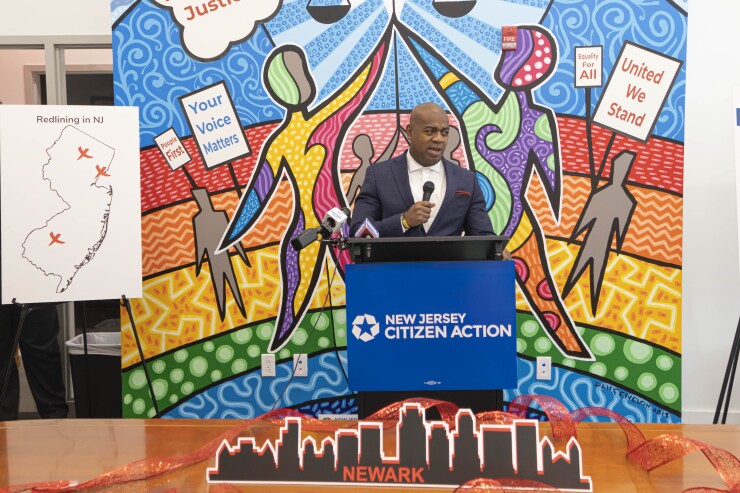
Community leaders and activists in New Jersey are urging regulators to set a higher bar for approving the pending merger between Lakeland Bancorp and Provident Financial Services.
Newark Mayor Ras Baraka, New Jersey Citizen Action and other activist groups want the Federal Reserve to mandate that Provident reach a community benefits agreement before moving forward with its
And the mayor also said that regulators should review the enforcement of a
Newark residents have been impacted by "historically pervasive and deliberate" lending practices," Baraka said at a recent press conference. He added that greater regulatory scrutiny and an agreement to support local residents is needed in "response to the kind of injustice and inequity that we see happening here today."
Lakeland's redlining settlement, the third-largest ever for the Justice Department, came one day after Iselin, New Jersey-based Provident announced the merger.
Under a consent order, Lakeland committed to making "all reasonable efforts" to open new branches in majority-minority neighborhoods in the Newark area within 18 months. It also agreed to boost community outreach, establish a mortgage subsidy fund and to provide staff training on the bank's obligations under the consent order and the Equal Credit Opportunity Act.
A Lakeland spokesperson did not respond to a request for comment. A Provident spokesperson wrote in an emailed statement that the bank has "expressly agreed" to assume Lakeland's obligations under the DOJ consent order.
"Accordingly, subject to regulatory approval of the proposed transaction, the combined organization will continue to adhere to all elements of the DOJ consent order," the Provident spokesperson wrote.
In December, New Jersey Citizen Action cited the DOJ's consent order in a letter to the Federal Reserve Bank of New York requesting a "New Jersey-specific" Community Reinvestment Act agreement as a condition of the proposed merger.
The group said that Lakeland had fallen behind in lending to low- to moderate-income minority communities compared with both Provident and other banks.
Citing data provided to regulators under the Home Mortgage Disclosure Act, New Jersey Citizen Action said that Lakeland operated 4% of its branches in low- to moderate-income communities between 2018 and 2021, while 7% were based in majority-minority neighborhoods.
Nearly a third of Provident's branches were based in low- to moderate-income communities during the same period, while the other banks included in the analysis operated, on average, 37% of their footprints in similar areas, the group said.
"Institutions guilty of discriminatory practices must be held accountable," Beverly Brown Ruggia, New Jersey Citizen Action's program director for financial justice, said in an interview.
She argued that the pending merger presents a chance to redress unfair lending practices that have harmed New Jersey communities.
"When banks get bigger, they must get better," Ruggia said. "The Fed has an opportunity to ensure that both of these things happen by requiring the merged bank to establish and implement impactful goals with stakeholder input."
Last month, the Fed's Board of Governors asked Provident's lawyer to provide additional information about the proposed Lakeland acquisition, including a description of the products and services that the bank "deems most beneficial" to lower-income customers.
Newark, home to more than 300,000 people, is a once-thriving industrial city 10 miles outside New York City. Around a quarter of the city's population lives below the poverty line, compared with a national average of 11.6%, according to the U.S. Census Bureau.
Baraka said at his recent press event that Newark residents are "still fighting to reverse the effects of redlining," the discriminatory practice of systematically denying financial services in certain areas based on race or ethnicity.
"To still be doing it now compounds the problem even more and makes it even more difficult for us to dig ourselves out of a hole," Baraka said.
Ken Thomas, CEO of Community Development Fund Advisors, argued that requiring a "legally unenforceable" community benefits agreement in addition to the DOJ's consent order would be "duplicative."
"Why put a bank under two agreements?" Thomas said, adding that Provident should be given a chance to comply with the Justice Department consent order. "And if community groups don't think enough has been done after that, then go back to the bank."
Jesse Van Tol, president and CEO of the National Community Reinvestment Coalition, said there are good reasons to go beyond what consent orders require. Those orders are crafted based on what prosecutors can actually prove, which sets a high bar, he said.
"The reason to go beyond consent orders is that the orders are narrowly tailored to the worst issues," Van Tol said. "When you're in a remedial situation with one or both of the banks, there should be a higher burden of proof to show that there's specific and meaningful ways in which the public is going to benefit."






